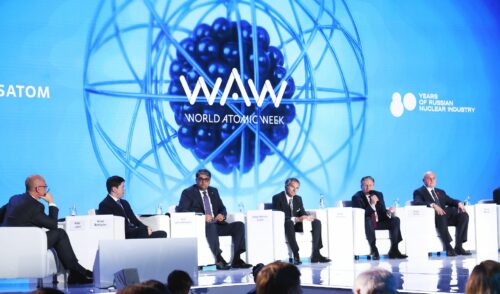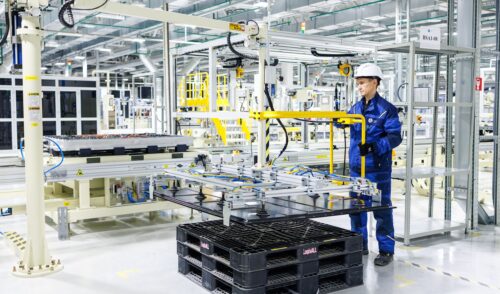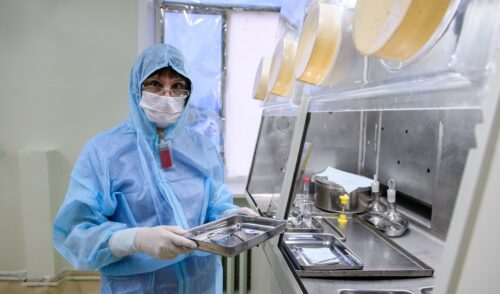
Helping the industry
back to contents– This September you celebrate the first anniversary as President of Rusatom International Network (RIN). Has RIN found its niche in the industry? What is it?
– Our niche was identified at the very beginning – RIN is an outpost of Rosatom on international markets and, in fact, a division managing Rosatom’s regional network. We streamline overseas processes and optimize export offerings of Rosatom Group companies.
Our task is to promote existing products and services and look for new opportunities. We have many companies whose products are not necessarily nuclear. RIN knows what and where is in demand and how to promote it on the market. Our regional offices are located in the countries of strategic importance for Rosatom. They accumulate all the information, monitor the market, and analyze risks and prospects. We monitor regional tenders, assist our companies in the bidding process, and provide support in the search for investors. We also assist exporting companies in avoiding late performance and subsequent penalties.
This is just a brief description. In general, Rosatom set six competencies for us to develop. This is what we do.
– Do investors readily participate in nuclear power projects?
– Not all of the investors look for quick profits. The life cycle of a nuclear power plant is nearly 100 years. It is a century-long project, and such projects are interesting for pension fund managers and other long-term investors.
– Which out of the six competencies would you emphasize?
– All competencies are important, but the most important is, in my opinion, coordination of international activities. Rosatom’s overseas offices are independent information channels shaping our perception of the market. I will give you an example. It might happen that several Rosatom Group companies participate in the same bidding process competing with each other. As a result, a foreign company wins the bid. Our task is to stop unreasonable competition and build a consortium for the tender. This happens often in the back end of the nuclear fuel cycle. We have several companies specializing in the back-end management services and advise them to work together – if any of them lacks a competency, we add competencies of the others, or vice versa. Our ultimate task is to create conditions for Rosatom companies to win the bid.
One more example. Let us say that Atomenergomash is ready to ship thermal station equipment to Kazakhstan. Our regional center gets information that the country plans to modernize 20 thermal stations, which means that we might sell 20 sets of equipment. The office in Kazakhstan is tasked to organize negotiations between Atomenergomash and prospective customers so that we have an order for at least three or five sets, if not all 20.
– And what if a company wants more independence on the international market?
– When coordinating, we do not attempt at managing anyone. Rather than managing, we provide information. This function is of great help for Rosatom companies. Their management is directly informed by us how to act on a particular market or in a country. And regional centers are quick to respond to changes. In any case, it is the management to decide which way to go.
We have found common grounds with almost all companies, and they are interested in dealing with us. A positive effect was produced by our re-organization into a non-profit company. RIN is wholly financed by Atomenergoprom and pursues no commercial goals.
– Have you made any estimates what contracts RIN has been involved in and what is their total amount?
– Our key performance indicators are the contract portfolio and revenue in regional terms. They stimulate our involvement in the promotion of Rosatom’s products and services on global markets. Our task is to assist in achieving portfolio and revenue targets to the maximum extent possible. It will be wonderful if our effort yields new projects which nobody has counted on.
– How many offices does RIN have and what are the plans of network expansion?
– Rusatom Overseas’ legacy included four offices – in Eastern Europe (Kyiv), Central Europe (Hungary, Slovakia and the Czech Republic), Singapore and South Africa. All of them, except for the office in Kyiv, were national marketing offices, not regional centers. We strengthened them, expanded their competencies and regional coverage.
National offices were turned into regional centers for Central and South Africa, Central Europe and Southeast Asia. In 2014, a regional center was opened in Western Europe and Central Asia. The office in Eastern Europe has a broader coverage and now includes Azerbaijan, Armenia, Georgia, Cyprus and Israel. A regional center for Latin America has been opened in Rio de Janeiro. Now we are in the process of opening a center for East Asia in Beijing to deal with China and Japan. The work is ongoing to open centers in Dubai (Middle East and North Africa), Mumbai (South Asia, including India, Bangladesh and Sri Lanka) and Washington (Canada, Mexico and the US).
– What are you guided by when opening a new office?
– We are guided by the goal to be present on all the continents. We select a leading country in the region and set up a center there, taking into account accessibility of the location and the level of diplomatic and other relations.
RIN is now at its development stage – all regional centers should be opened by the year end. It is too early to estimate the outcomes, but I am sure they will be significant. Apart from regional centers, we will set up national offices in the countries where we have large projects. For example, the center for the Middle East and North Africa will be supplemented with an office in Turkey where the construction of Akkuyu is about to start. Similar offices will be opened in Jordan and Vietnam.
However, each case is dealt with on an individual basis. If the flight is short or the location is accessible by car and there are no special cultural differences, why should we open a national office?
– Competitors of Rosatom do not have a similar network, do they? I know though that Westinghouse has had offices all over the globe.
– Any international company has representative offices. Areva operates rep offices in more than 10 countries. When we formulated the RIN concept, we relied on several facts. First, Rosatom is the only global company with a full nuclear fuel cycle – these are competencies and products which our competitors lack. Second, Rosatom produces many more things than just VVER reactors and the AES (nuclear station) project. We took Siemens and Alstom as an example of global leaders operating in the innovative power segment. Siemens and Alstom have tens of offices. We see no need in opening so many as costs will soar. Our centers are in charge of the entire region. Seven to nine people are able to do all the work needed, bringing total costs down significantly.
Regional centers have another advantage. Foreign partners often find it difficult to differentiate between many industry brands. Regional centers serve as one stop shop in this situation.
– Has the ruble depreciation affected your plans or does it restrain your growth?
– We are financed in rubles, but our expenses – rent, payroll, etc. – are in other currencies. So our task is to forecast expenses as accurately as possible and re-allocate our efforts. Plans for 2015 will not be affected by the depreciation anymore. All the centers will be opened as planned if nothing extraordinary happens. Plans for the next year are likely to be adjusted.
– Who works in the centers?
– The centers are headed by RIN regional vice-presidents who have a long track record in the nuclear industry or energy industry in the relevant region or in international business and, consequently, have good contacts in the industry. Other employees are either Russian or local industry professionals. It is but natural that people sharing a common language with both existing and potential partners, having industry contacts, knowing regional mentality and culture open up better business prospects.
– Have the regional centers ever acquired new partner countries?
– The regional center for Latin America has established contacts with Bolivia. Until recently, Rosatom has had no contacts with Israel but our center for Eastern Europe analyzed the market, particularly the power and petrochemical industries, and identified potential customers. Our delegations have had meetings with all major market players and stay in contact to discuss cooperation opportunities.
We expand opportunities of Rosatom companies on overseas markets, so it is important for us that they are active on the markets opened for them. Regional expertise includes understanding of what is in demand on a particular market. Since the beginning of the year, Rosatom’s companies and management have been receiving our regular monthly, quarterly and annual industry marketing reports. If required, we also prepare ad hoc reports.
– And what is in demand now?
– Apart from reliable nuclear stations, which are our key product, customers are interested in water desalination, nuclear medicine, small and medium capacity reactors, and research reactors. Conventional heat generating equipment is also in demand. This is what we can produce – and very good quality to boot. Petrochemicals are another industry which needs equipment produced by Rosatom companies. In a short while, we are going to Georgia although just recently the country was not considered our target market. For example, they are very much interested in the development of hydropower. This is what we produce, too. Rosatom’s subsidiary Ganz manufactures hydropower equipment of a capacity which can satisfy our potential partners.
– It sounds strange that Rosatom sells hydropower equipment…
– Our companies make a variety of products. Among them are composite materials, which can be easily used to build yachts, rolls for heavy industries, components for ships, and many more. We have solid expertise in mechanical engineering, energy saving technologies and the space industry. There are competencies, capabilities and professionals. The goal is to enter the market. Is it so important what will bring profits? New orders keep workplaces and create new jobs. Currency revenue is crucial when the ruble depreciates. By the way, depreciation is another advantage over the competitors as product costs decrease. This advange is not permanent though.
– Will Rosatom’s revenue from new international businesses soar in a year or two?
– I do not know whether it will soar, but the task of Rosatom and RIN is to facilitate growth. Our successful effort on overseas markets is yet another proof that we are a team working for the industry’s benefit. RIN was established only a year ago. This is a period when others just begin spending, but we have something to boast about. We will consider it great success if our joint efforts bring about many contracts, including those for NPP construction worth billions.




